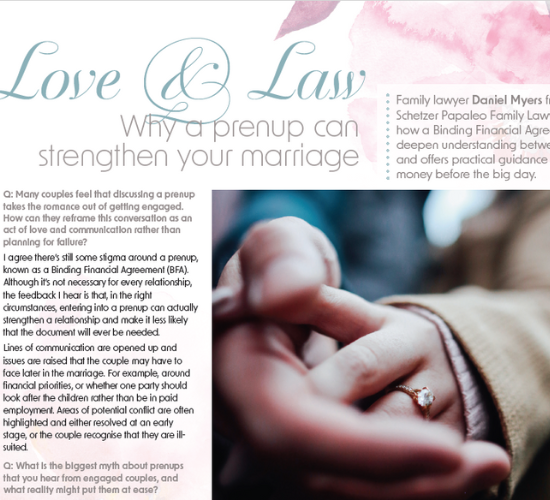What’s in a name? That which we call a rose, by any other name would smell as sweet.
What do you do when you can’t agree on your child’s name or, worse, the other parent registers the birth (and name) without your knowledge or consent?
Jodylee Bartal, Partner and Accredited Family Law Specialist explores this surprisingly common dilemma.
Australia’s Best Bogan Baby Names have been released for 2022 and it got me thinking about naming disputes in the Victorian Civil and Administrative Tribunal (VCAT) and in the Federal Circuit and Family Court of Australia (FCFCOA).
This year, names such as Brexleigh, Iveighsee, Juul (yep, the vape brand), Kardi, Kior (I blame the Kardashians) and Miraccle made the list of Best Bogan Baby Names for girls. Draxler, Knoxlee, Ledgen and Roar made the list of Best Bogan Baby Names for boys.
So, what do you do when you can’t agree on your child’s name or, worse, the other parent registers the birth (and name) without your knowledge or consent?
Name Disputes – Children
A child’s name is considered a ‘major long term care welfare and development decision’ requiring consultation and agreement between the parents. So what happens when parents don’t agree, or one parent registers the birth (and name) without the other parent’s consent?
Naming Conventions adopted by Births Deaths & Marriages
The Name Dispute Policy published by Births Deaths & Marriages Victoria sets out what the parents must do and what the Registry’s policy is for assigning a child’s name in the event of a dispute.
The Registry will be satisfied that parents can’t agree when:
- there is no agreed name on the birth registration; and
- mediation is unsuccessful (including a situation where one of the parents refuses to participate).
The parents can then elect for the Registrar to assign the name or they can apply to the County Court for an order directing the Registrar to assign a name.
If the parties elect for the Registrar to assign the name, he/she will do so in the following way:
- Given names: The given name preferred by each parent, in alphabetical order
- Middle names: No middle names unless the parents agree. If they haven’t agreed, the second given name will, in effect, be the child’s middle name
- Family name: A family name consisting of – the surname of both parents, in alphabetical order, and hyphenated.
Review process at VCAT or the Supreme Court
If the name was assigned by the Registrar, the parents can apply for a review of the Registrar’s decision. This is an administrative review which looks at whether the Name Dispute Policy was followed and considers the exercise of the Registrar’s discretion in the context of that Policy.
If the name was assigned by the County Court, the parent(s) may appeal to the Supreme Court.
Federal Circuit & Family Court of Australia (FCFCOA)
In the FCFCOA, the name dispute will be determined having regard to the best interests of the child and the considerations that are taken into account include:
- the advantages and disadvantages, both long and short term, to the child if his/her name remains unchanged;
- the time the child spends with each of his/her parents;
- the degree of identification that the child has with each parent and with other children of the father and mother;
- any embarrassment likely to be experienced by the child; and
- any confusion of identity that may arise for the child, if the name is changed or not changed.
Overseas approach – What are other Jurisdictions Doing?
Name disputes are of course not an exclusively ‘Australian problem’. For example, on 27 April 2022, Italy’s Supreme Court ruled that children born in the Country will be given their mother’s and their father’s surnames at birth, declaring the automatic practice of only giving children their father’s surname “constitutionally illegitimate”.
Italy joins other jurisdictions including France, Germany and Spain in (also) recognising the mother’s family name and this decision follows several Italian cases involving siblings having different surnames (depending on the parents’ marital status and siblings not sharing the same biological father).
Name Dispute – Adults
In Australia, there is no legal requirement for men or women to take their spouses’ family name, whether they legally marry or live together on a genuine domestic basis (as de factos). This being said, the majority of women still take their husband’s name upon marriage. There is a growing trend of the couple both changing their surnames to adopt a hybrid (think: Bennifer, KimYe or Brangelina) or some other agreed name.
After separation, people can and many do retain their ex-partner’s surname or continue to use their mutually adopted surname.
You would be surprised to know that a person (18+) can change their name to your surname, with or without your knowledge or consent. Getting the person to change it back, or at least stop using your surname, is fraught with difficulty. This is especially so when the person has already changed their name multiple times in a relatively short space of time.
Sometimes, adoption and use of another person’s family name can be misleading, by implying that a relationship exists when it may not.
What can you do about it? Since there is no specific legal action available (in Australia – the right exists elsewhere) you may need to:
- negotiate;
- do a deal (it’s easier if you have some bargaining power, such as unresolved proceedings for a financial / property settlement); or
- live with it!
Several Countries do have legal requirements / court actions available to address this situation. Consider whether any of those jurisdictions may apply.
For advice on this topic, please contact us.


